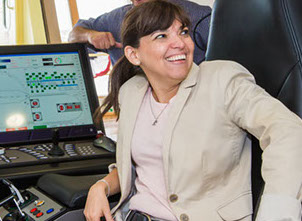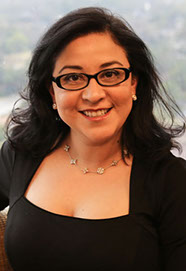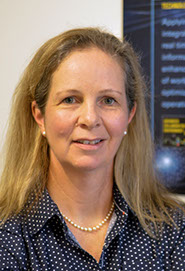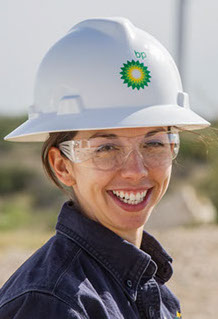
Women with Energy
Traditionally, the energy industry has been dominated by men. But that’s rapidly changing, and today many women, including Latinas, are making their mark in this field.
According to BP’s Energy Outlook, the global demand for energy is expected to rise by 34 percent from 2013 to 2035. In order to produce the energy the world needs, companies like BP must rely on the brightest minds in a diverse workforce, regardless of gender. LATINO Magazine spoke with several women who are not only helping produce the energy to fuel America, but are dedicated to paying it forward and ensuring others learn about the vast opportunities afforded to them by pursuing a career in science, technology, engineering and math (STEM).
2035. In order to produce the energy the world needs, companies like BP must rely on the brightest minds in a diverse workforce, regardless of gender. LATINO Magazine spoke with several women who are not only helping produce the energy to fuel America, but are dedicated to paying it forward and ensuring others learn about the vast opportunities afforded to them by pursuing a career in science, technology, engineering and math (STEM).
Imagine someone driving to an interview with a Fortune 500 company for her first internship, in a car without air conditioning in the Texas heat. Then imagine her getting a flat tire on the way, flagging down a Good Samaritan to fix the flat, and still making it to the interview on time. Wouldn’t you hire her?
It’s no wonder Aleida Rios got the job and went on to complete three more summer internships with BP. Her grit and determination earned her a full-time position after graduating with a chemical engineering degree from Texas A&M University. Twenty-five years later, she’s the vice president of BP’s operations in the Gulf of Mexico, which produce 249,000 barrels of oil equivalent per day. In this role, she manages a $1 billion budget and oversees a team of more than 2,000 employees and contractors.
 Rios wants to make sure more Latinas can find careers in STEM fields. “For girls in particular, it’s important early on to get them into math and science, and if they’re doing well, to encourage them to keep at it,” she says. “It’s also important to expose them to the quality of life that STEM careers provide.”
Rios wants to make sure more Latinas can find careers in STEM fields. “For girls in particular, it’s important early on to get them into math and science, and if they’re doing well, to encourage them to keep at it,” she says. “It’s also important to expose them to the quality of life that STEM careers provide.”
Unfazed by working in a male-dominated industry, Rios has been at the forefront of efforts to encourage diversity at BP. She co-founded the company’s first Latino employee resource group, Energia, and the Gulf of Mexico Women’s Leadership Council. She’s on the executive steering committee of the BP Women International Network (BP WIN) as well as BP’s Global Operations Executive Leadership Team, and sits on the company’s Supplier Diversity Council.
Rios and her family immigrated to the United States when she was eight years old. In Mexico, her town’s school only reached the fifth grade, and her parents, Maria and Roberto, hoped to provide their four children greater opportunities through education by moving to the U.S. They chose Dallas but eventually moved to Houston. “After one winter in Dallas, my parents thought it was just too cold, so we ventured south,” Rios says with a chuckle.
Houston Independent School District did not offer bilingual or English Language Learner programs at the time, and Rios only spoke Spanish. But she found that math was a universal language that she excelled at. “I was devastated when I began school in the U.S. because I had been an excellent student in Mexico, but not knowing the language at first did affect my grades — except for math,” she admits. Her early mentors included teachers who encouraged her to continue studying math and science, and she ultimately attended a magnet school with a focus on careers in oil and gas. Not really sure what career she hoped to pursue, she entered an Inroads program that exposed underrepresented students to the workplace, beginning in their junior year of high school. Part of the program involved having students apply for internships, which is how she came to BP.
continue studying math and science, and she ultimately attended a magnet school with a focus on careers in oil and gas. Not really sure what career she hoped to pursue, she entered an Inroads program that exposed underrepresented students to the workplace, beginning in their junior year of high school. Part of the program involved having students apply for internships, which is how she came to BP.
In her career, she’s seen the energy industry become much more diverse, and she hopes young women will consider it. “I’ve heard girls worry that a career in oil and gas will be difficult if they want to have children or will require a lot of travel or work hours, but that can be true of any job,” she insists. “A career in STEM at a company like BP really offers a quality of life that can make these concerns less stressful because you’ll have a job you will love and the income to help with work-life balance issues. That’s what I hope girls will consider and not pass up.” She herself is a dual-career wife and mother, married 21 years and raising three teenage boys.
However, it’s important to note that the energy industry relies on diverse talent with distinct skills. Kathleen Martinez, senior director of national strategic relationships, shows that you don’t have to be an engineer to make a difference in the energy sector and at BP.
The Laredo, Texas, native (and youngest of 14 children) graduated from the University of Texas at San Antonio with a degree in marketing. After graduation, she spent time working in marketing, public relations and international relations, and served as a press secretary on Capitol Hill. Before joining BP, Kathleen managed the corporate foundation for BBVA Compass Bank in Houston. While Kathleen had no previous exposure to the oil and gas industry, her varied experience and leadership roles led to her current role at BP.
Today, Martinez draws on her past experience and skills to build national strategic relationships and partnerships for BP. She works with stakeholders internally and externally to build BP’s reputation as a committed corporate citizen. Among the key initiatives she oversees is the company’s national commitment to STEM education.
Some of the programs that she has launched at BP include the Energy Education Initiative in partnership with the Association of Science Technology Centers, focused on helping teachers to deliver energy education in the classroom. She also leads BP’s engagement with programs like Million Women Mentors, a national initiative to mobilize 1 million mentors — both men and women — to help girls learn more about STEM-related careers. Rios serves on BP’s Million Women Mentors Leadership Council, a committee of some of the company’s top women leaders who champion employee participation in the program. “Most of today’s jobs, good jobs that will provide good wages, require STEM skills,” says Martinez. “Part of my job is to work with our employees to reach as many students as possible and inform them about our industry and what they need to do today to be successful tomorrow. I am so proud to work for a company that is committed to helping improve pathways to STEM education and careers, especially for girls and underrepresented minorities.”
 Like Rios, Martinez participates in BP WIN, which has a mission to be “a catalyst to attract and retain talent by facilitating professional and personal growth through a strong community where career networks are built.” BP WIN Americas has eight chapters in the U.S. and Canada, with over 2,000 members.
Like Rios, Martinez participates in BP WIN, which has a mission to be “a catalyst to attract and retain talent by facilitating professional and personal growth through a strong community where career networks are built.” BP WIN Americas has eight chapters in the U.S. and Canada, with over 2,000 members.
The executive sponsor of BP WIN Americas is Morag Watson, vice president of digital innovation at BP. In this role, she is responsible for making sure that BP is leveraging the latest emerging trends in digital technology. She manages a team who probe the latest technological innovations and developments to find solutions to business challenges. Over Watson’s 25-year tenure at BP, her diverse skills and experiences have taken her to roles based in many different countries, including the U.S. and U.K., as well as Venezuela and Colombia, where she became fluent in Spanish. She currently is BP’s executive sponsor for MIT, serves on the advisory board of Intel Capital, Price Waterhouse Coopers Exchange and BP’s Diversity & Inclusion Council, and received the Association for Women in Computing award for Top Women in Technology.
“I’m very Scottish, and I was brought up in a culture that did not make a big deal of individual differences,” shares Watson. “I’m from a family of four girls, and we were encouraged to work hard because if we did, good things would happen, and that worked for me for a long time. I had never heard of a ‘glass ceiling’ but one day it struck me that maybe it was more like a concrete ceiling for women, where you couldn’t even see the other side. That’s when I started playing a much more active role. So when they approached me to be the sponsor last year, I signed up.”
Watson successfully sponsored a women’s conference to bring together the company’s female technology employees to meet, network, share experiences, and identify mentors. Current programs in the works include a gender talk toolkit available to all BP employees to share how males and females interact, including biases. One of the most successful programs so far has been International Women’s Day, held in cities around the world and for which BP is a sponsor.
“I wouldn’t work in company that didn’t have programs like these,” says Watson. “I think it’s an essential part of who we are, because it allows people to be who they are and bring their whole selves to work.”
who we are, because it allows people to be who they are and bring their whole selves to work.”
An up-and-coming leader at BP WIN is Annette Andersen, performance services manager for BP Wind Energy. A graduate of the University of Michigan, she began her 10-year career as an engineering co-op at the BP refinery in Whiting, Indiana. In 2014, she became deputy facility manager at BP’s Sherbino Mesa II Wind Farm in wide-open West Texas, working with a team of engineers and operators to enhance the site’s performance, reliability and safety. This year, Andersen came to Houston to manage the performance services team, which provides data analytics for BP Wind Energy.
BP Wind Energy is among the top wind energy producers in the U.S., with interests in 15 wind farms in nine states across the country. Its wind farms have a gross generating capacity of 2,285 megawatts of electricity, enough to power all the homes in a city the size of Philadelphia.
Andersen started a peer mentoring group geared toward young professionals within the wind business, and is committed to mentoring other women, as well as STEM outreach. She has found that BP WIN offers welcome opportunities to interact with other women.“It’s been very helpful to me,” she shares. “Often you’re the odd one out, being the only female. It’s really nice to be in a room with other women who are also the odd ones out, to discuss how we can work together and move forward.”
Rios, Martinez, Watson and Andersen are just a handful of those who are changing things for women in energy — not only at BP, but across the wider industry. Their ambition, accomplishments and passion for STEM are helping to advance the industry, while inspiring the next generation of women to pursue their own pathways to success.
Valerie Menard
Kathleen Martinez and Aleida Rios
Morag Watson
Annette Andersen
Aleida Rios